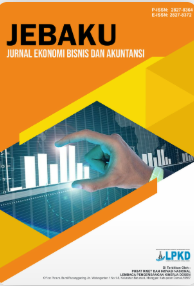Pengaruh Kompetensi Sumber Daya Manusia, Pemanfaatan Teknologi Informasi, dan Training Kerja Karyawan terhadap Kualitas Laporan Keuangan
DOI:
https://doi.org/10.55606/jebaku.v5i3.5663Keywords:
Employee Training, Financial Report, Human Resource, Information Technology, TrainingAbstract
This study aims to examine the impact of human resources (HR) competencies, the utilization of information technology (IT), and employee training on the quality of financial reports at PT Pupuk Indonesia Holding Company. High-quality financial reports are crucial for decision-making within the company, and accurate and reliable reports are necessary for overall company performance. Therefore, this research focuses on assessing how these factors influence the quality of financial reporting within the company. The study adopts a quantitative approach with data collection through surveys. A questionnaire was distributed to 37 accounting staff members at PT Pupuk Indonesia Holding Company to gather data on HR competencies, IT utilization, employee training, and the quality of financial reports produced. Data analysis was performed using linear regression to test the relationships between the variables. The analysis results show that HR competencies and IT utilization have a positive and significant impact on the quality of financial reports. This indicates that improving employee skills and knowledge, along with optimizing the use of information technology systems, can enhance the quality of the financial reports generated by the company. On the other hand, employee training did not have a significant effect on the quality of financial reports. This may be due to the lack of relevance between the training material provided and the practical needs of daily work. These findings highlight the importance of focusing on improving employees' competencies in accounting and better utilization of IT systems to produce more accurate and efficient financial reports. The company should consider developing more advanced information systems and providing training that is more relevant to the needs of the job in order to improve the quality of the financial reports produced.
Downloads
References
Amer, F., Hammoud, S., Khatatbeh, H., Lohner, S., Boncz, I., & Endrei, D. (2022). The deployment of balanced scorecard in health care organizations: is it beneficial? A systematic review. BMC Health Services Research, 22(1), 65. https://doi.org/10.1186/s12913-021-07452-7
Awalanty, A. P., Linawati, & Tohari, A. (2024). Analisis metode balanced scorecard sebagai pengukuran kinerja Puskesmas Prambon. Jurnal Ekonomi, Bisnis Dan Manajemen (EBISMEN), 3(3), 16. https://doi.org/10.58192/ebismen.v3i3.2428
Aziza Putri, I., Pawelas Arso, S., Sriatmi Bagian Administrasi dan Kebijakan Kesehatan, A., & Kesehatan Masyarakat, F. (2017). Analisis pengukuran kinerja Rumah Sakit Umum Daerah (RSUD) K.R.M.T. Wongsonegoro Kota Semarang dengan pendekatan balanced scorecard. Jurnal Kesehatan Masyarakat, 5(4), 2356-3346. https://doi.org/http://ejourna13.undip.ac.id/index.php/jkm
Betto, F., Sardi, A., Garengo, P., & Sorano, E. (2022). The evolution of balanced scorecard in healthcare: A systematic review of its design, implementation, use, and review. International Journal of Environmental Research and Public Health, 19(16), 10291. https://doi.org/10.3390/ijerph191610291
Creswell, J. W., & Poth, C. N. (2019). Qualitative inquiry and research design: Choosing among five approaches. SAGE Publications.
David, F. R., & David, F. R. (2017). Strategic management: A competitive advantage approach: Concepts and cases (17th ed.). Pearson Education.
Fiantika, F. R., Wasil, M., Jumiyati, S., Honesti, L., Wahyuni, S., Mouw, E., Jonata, I., Mashudi, I., Hasanah, N., Maharani, A., Ambarwati, K., Noflidaputri, R., Nuryami, & Waris, L. (2023). Metodologi penelitian kualitatif. PT. Global Eksekutif Teknologi.
Heilat, H. B., Gharaibeh, M. K., Shtaiyat, W. M., Gharaibeh, R. S., Ananbeh, A. M., Baniyaseen, M. J., Alsharaydeh, S. M., Alqawaba'h, A. B., Alzu'bi, E. A., Amayreh, N. G., & Aldawagreh, R. R. (2025). Patients' satisfaction with services provided by family physicians at the Comprehensive Healthcare Centers in Northern Jordan. Journal of Family and Community Medicine, 32(1), 28-35. https://doi.org/10.4103/jfcm.jfcm_185_24
Judijanto, P. L., Wibowo, G. A., & Karimuddin. (2024). Research design: Pendekatan kualitatif dan kuantitatif. PT Sonpedia Publishing.
Kaplan, R. S., & Norton, D. P. (1996). Strategic learning & the balanced scorecard. Strategy & Leadership, 24(5), 18-24. https://doi.org/10.1108/eb054566
Kartini, T., Aulia, S., & Ardiansyah, A. (2023). Pengaruh kualitas pelayanan terhadap kepuasan pasien di Klinik Sinar Winaya Medika Sagalaherang. The World of Business Administration Journal. https://doi.org/10.37950/wbaj.vi.1668
Komaling, J., Nelwan, J. E., Vanda, D., Doda, D., & Belakang, A. L. (2022). Implementasi balanced scorecard dalam penyusunan rencana strategis di Rumah Sakit Cantia Tompasobaru. Sam Ratulangi Journal of Public Health, 3(2).
Lukman Effendy, Baiq Anggun Hilendri Lestari, & Rohyadi, I. (2020). Balanced scorecard (BSC): Rekayasa pada entitas rumah sakit. Jurnal Riset Akuntansi Aksioma, 19(1), 155-182. https://doi.org/10.29303/aksioma.v19i1.91
Mare, R. A. A. S., & Triase, T. (2024). Rancang bangun sistem informasi monitoring kinerja karyawan berbasis web dengan metode balanced scorecard pada BPJS Ketenagakerjaan. JTIM: Jurnal Teknologi Informasi Dan Multimedia, 6(2), 181-195. https://doi.org/10.35746/jtim.v6i2.561
Menna, A. D., & Temesvari, N. A. (2022). Application of the balanced scorecard as a benchmark for hospital performance: Systematic review. Jurnal Manajemen Informasi Kesehatan Indonesia, 10(1), 42. https://doi.org/10.33560/jmiki.v10i1.379
Moleong, L. J. (2021). Metodologi penelitian kualitatif. PT Remaja Rosdakarya.
Putri Citradika, D., & Satrio, D. (2021). Implementasi balanced scorecard di Rumah Sakit Umum Daerah Kab. Batang. RISTEK: Jurnal Riset, Inovasi Dan Teknologi Kabupaten Batang, 6(1), 38-46. https://doi.org/10.55686/ristek.v6i1.108
Riwu, S. L., & Wibowo, A. (2021). Penilaian kinerja rumah sakit dengan menggunakan pendekatan balanced scorecard: Systematic review. Jurnal Manajemen Kesehatan Yayasan RS.Dr. Soetomo, 7(2), 267. https://doi.org/10.29241/jmk.v7i2.638
Sitanggang, R., Bachtiar, A., & Oktamianti, P. (2023). Penggunaan balanced scorecard (BSC) pada organisasi rumah sakit: A systematic literature review. PREPOTIF: Jurnal Kesehatan Masyarakat, 7(1), 197-206. https://doi.org/10.31004/prepotif.v7i1.12347
Sugiyono. (2019). Metode penelitian kuantitatif, kualitatif, dan R&D. Penerbit Alfabeta.
Vip Paramarta, Suwoko Tya Wicaksono, Nina Risnawaty, Ida Ayu Triana, Arnita Niroha Halawa, & Intan Permatasari. (2023). Implementasi balance scorecard dalam analisis kinerja rumah sakit di Indonesia. Jurnal Manajemen Dan Ekonomi Kreatif, 1(3), 88-100. https://doi.org/10.59024/jumek.v1i3.117
Downloads
Published
How to Cite
Issue
Section
License
Copyright (c) 2025 Jurnal Ekonomi Bisnis dan Akuntansi

This work is licensed under a Creative Commons Attribution-ShareAlike 4.0 International License.









